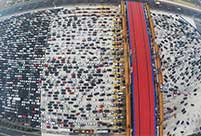

 |
| (File Photo) |
China's economy posted a 6.9% growth year on year in the third quarter of 2015, the National Bureau of Statistics (NBS) announced on Monday.
The growth rate, which is the slowest since the first quarter of 2009, dragged the growth in the three quarters down to 6.9 percent from 7 percent in the first half.
According to preliminary accounting, the GDP, calculated at comparable prices, reached48.8 trillion yuan in the first three quarters, an increase of 6.9 percent.
The sub-quarter data shows the GDP increased 7 percent in the first quarter, 7 percent inthe second quarter, and 6.9 percent in the third quarter respectively.
The added value of the primary industry was 3.9 trillion yuan, an increase of 3.8 percent;the secondary industry was 19.8 trillion yuan, an increase of 6 percent; the tertiary industry was 25 trillion yuan, an increase of 8.4 percent.
China's value-added industrial output expanded 5.7 percent year on year in September, down from 6.1 percent in August, according to the NBS. Year-on-year growth in the first three quarters stood at 6.2 percent, slightly down from 6.3 percent in the first eight months.
The data showed a slowdown from the 7-percent growth in the first two quarters, mainly due to structural changes in the domestic market and slower economic growth around the world, said NBS spokesperson Sheng Laiyun.
The country's industrial sector is still battling overcapacity, which will continue to put downward pressure on the field in the short term, said Sheng
According to China Daily, the growth was particularly dragged down by real estate investment,which further slowed to 2.6 percent in the first nine months, from 12.5percent recorded in the same period just a year ago.
Huang Yiping, an economics professor with Peking University, and a member of the central bank advisory committee, told China Daily that downward pressure will persist in the remainder of this year and next year, because the economy's traditional growth engines, such as labor-intensive manufacturing and capital-intensive heavy industries are losing stream, while new engines, such as high value-added manufacturing and services sectors, are developing but is not big enough to fill in the slack.
"It will take quite a while to foster those industries that will drive the next round of medium-to-high growth, so I think the downward pressure willbe there for a while," he said. "Policy prop-up might bring the growth up temporarily but that's not going to last."
From the third quarter of 2015, China began to implement reform in accounting quarterly GDP. Its quarterly GDP will be accounted separately, namely Q1 GDP, Q2 GDP, Q3 GDP and Q4 GDP, instead of being accounted cumulatively like Q1 GDP, Q1-Q2 GDP, Q1-Q3 GDP and Q1-Q4 GDP, according to an NBS statement.
Compared with the traditional way, quarterly GDP accounting will be able to measure the economic activities in a quarter more accurately and capture short-term fluctuations of the economy more sensitively.
 Photos of beautiful teacher hit the Internet
Photos of beautiful teacher hit the Internet Transparent Over-cliff Path Cracked Suddenly, Causing Panic among Tourists
Transparent Over-cliff Path Cracked Suddenly, Causing Panic among Tourists Bride-to-be tries to save drowned man while taking wedding photos
Bride-to-be tries to save drowned man while taking wedding photos Models change clothes on street in Hangzhou
Models change clothes on street in Hangzhou Night life in Qingdao
Night life in Qingdao In pics: army beauties across world
In pics: army beauties across world Winding mountain road
Winding mountain road
 Math teacher makes 'solar powered electric car'
Math teacher makes 'solar powered electric car' Heavy traffic turns expressway into huge parking lot
Heavy traffic turns expressway into huge parking lot Top 20 hottest women in the world in 2014
Top 20 hottest women in the world in 2014 Top 10 hardest languages to learn
Top 10 hardest languages to learn 10 Chinese female stars with most beautiful faces
10 Chinese female stars with most beautiful faces China’s Top 10 Unique Bridges, Highways and Roads
China’s Top 10 Unique Bridges, Highways and Roads Leading the blind
Leading the blind Molding mathletes
Molding mathletes PLA prowess persists without tough talk
PLA prowess persists without tough talk Corn price plummet hits farmers’ income
Corn price plummet hits farmers’ incomeDay|Week